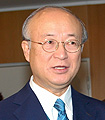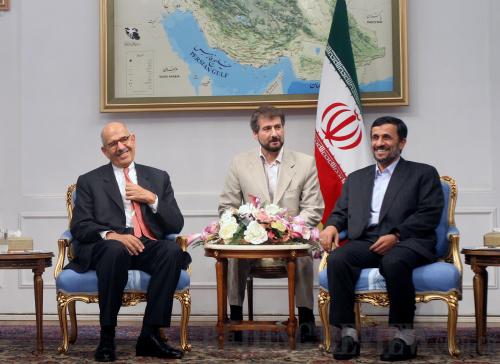|
 |
|
NEW ARMS: Yukiya Amano (LIU GANG) | As Yukiya Amano, a former Japanese diplomat, assumed office as director general of the International Atomic Energy Agency (IAEA) on December 1, 2009, he did so by highlighting momentous challenges in a world fraught with the perils of nuclear proliferation.
There are many parallels between Amano and Mohamed ElBaradei. Not unlike his Egyptian predecessor, Amano is a former law student who had served with distinction in the diplomatic corps with an emphasis on arms control and disarmament.
ElBaradei is widely known for his ability to forge consent among differing—and often opposing—parties. Amano, on the other hand, is known more for his low-key tactics, with a cautious style characterizing his work.
 |
|
ENRICHING NEGOTIATIONS: Iranian President Mahmoud Ahmadinejad meets then IAEA Director General Mohamed ElBaradei in Tehran on October 4, 2009, to discuss the Iranian nuclear issue (XINHUA) | During his 12 years in office, ElBaradei witnessed momentous events in a nuclear-armed world, as Iraq, North Korea, Iran and Syria emerged as major flashpoints. Under ElBaradei's watch, the IAEA became one of the busiest international organizations in the world.
But Amano's strength as a diplomat has also proven pivotal against a background of international disarmament issues. In this role, he has greatly influenced the Japanese Foreign Ministry—including its overall policies on disarmament and nuclear energy.
During his tenure as a diplomat, Amano also participated in negotiations extending the Nuclear Non-Proliferation Treaty in 1995 as well as negotiations on the Comprehensive Nuclear Test Ban Treaty in 1996 and the Biological Weapons Convention in 2001. Through these endeavors, Amano gained extensive experience in disarmament, nuclear non-proliferation and nuclear energy policies.
The origins of the IAEA date back to December 1954, when the UN General Assembly adopted a resolution calling for an international institution devoted to the peaceful use of atomic energy. Nearly two years later in 1956, representatives of 82 member nations passed the IAEA Statute, aimed at safeguarding and supervising the peaceful use of nuclear energy worldwide.
In October of the following year, the IAEA went on to hold its first General Conference to announce its formal establishment. The agency's Secretariat now boasts a staff of more than 2,200 from 90 countries around the world.
By the end of 2009, the IAEA had represented 150 member states. The body itself is comprised of a General Conference with representatives from each member state that meets annually, a Board and a Secretariat.
The board, meanwhile, is the agency's decision-making body, and holds five meetings a year. According to the IAEA Statute, members of the board rotate every year, and are designated and elected by the general conference.
Since its establishment, the IAEA has been vigilant in safeguarding, supervising and implementing the peaceful use of nuclear energy. In particular, it has presided over the formulation of numerous vital international conventions on nuclear safety, radiation safety and waste management safety standards.
In 1984, China became an IAEA member state, and has since participated in the formulation of its international conventions. Now, it has evolved into one of the most important powers represented within the agency.
Amano now confronts many of the same issues that plagued his predecessor, and much of the international community is waiting to see what happens next.
Indeed, there are three crucial issues the IAEA and its leadership must face in an increasingly multi-polar world.
The first question is how the IAEA can properly handle its relations with major world and regional powers.
Unfortunately, this may not be all that easy—something that was clear when the IAEA itself was formed shortly after World War II.
In fact, at the time, some nations feared the agency would become a regime with which nuclear-armed states could maintain their atomic monopoly.
For decades, major powers have never ceased in their efforts at enhancing their roles in the IAEA's decision-making processes. As director general, Amano must first employ his diplomatic skills with these nations properly and discreetly.
| 